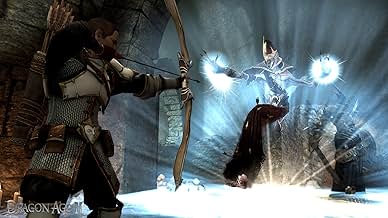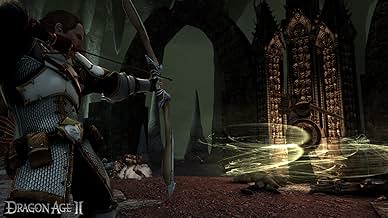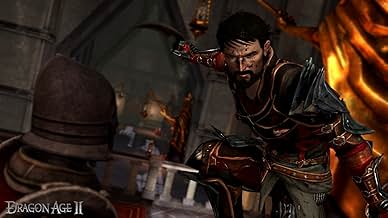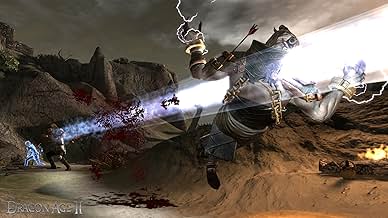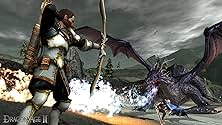Füge eine Handlung in deiner Sprache hinzuThe medieval world of Thedas is invaded by demonic Darkspawn. Hawke and his family are saved by a powerful mysterious witch Flemeth. They end up in a foreign city where racial, religious and... Alles lesenThe medieval world of Thedas is invaded by demonic Darkspawn. Hawke and his family are saved by a powerful mysterious witch Flemeth. They end up in a foreign city where racial, religious and political tensions threaten to tear it apart.The medieval world of Thedas is invaded by demonic Darkspawn. Hawke and his family are saved by a powerful mysterious witch Flemeth. They end up in a foreign city where racial, religious and political tensions threaten to tear it apart.
- Auszeichnungen
- 4 Nominierungen insgesamt
- Hawke - Female
- (Synchronisation)
- Hawke - Male
- (Synchronisation)
- …
- Anders
- (Synchronisation)
- …
- Aveline Vallen
- (Synchronisation)
- Bethany Hawke
- (Synchronisation)
- Carver Hawke
- (Synchronisation)
- …
- Fenris
- (Synchronisation)
- …
- Isabela
- (Synchronisation)
- Knight-Commander Meredith Stannard
- (Synchronisation)
- Varric Tethras
- (Synchronisation)
- Additional Voices
- (Synchronisation)
- Keran
- (Synchronisation)
- …
- Grand Cleric Elthina
- (Synchronisation)
- Viveka
- (Synchronisation)
- …
- Captain Ewald
- (Synchronisation)
- …
- Additional Voices
- (Synchronisation)
- Additional Voices
- (Synchronisation)
Empfohlene Bewertungen
Although Hawke, the game's protagonist cannot be as well-defined as the protagonist in Origins, having a definitive background allows Hawke to be have the most personal storyline, as opposed to being isolated from the narrative as a savior archetype. Not only that, but Hawke themselves is a very personable character, whose personality can be defined and redefined by the dialogue choices you make, which do have some impact in dialogue and subplots.
Furthermore, restricting the game to a singular location allows you to have a more personable experience with the location, as opposed to simply stopping by for a few hours to save everyone, you experience what life is in Thedas, and you see how the narrative in the world around you progresses.
The narrative, although being my least favorite aspect of this game, especially due to the game's third act and how it handles the overarching conflict, still manages to be immersive - out of every Dragon Age game and DLC, this is the only game that has made me legitimately cry because the game managed to make me care about its more minor characters.
The gameplay is also the most enjoyable in the series. Some do not enjoy the more fast-paced and action packed change of style, but it personally made the game's combat more enjoyable for me - Dragon Age is partially notorious for having rather bland gameplay, and Dragon Age: II provides the most enjoyable combat experience.
Finally, the characters are what truly make this game my favorite of the series. Not only are there practically no restrictions of who you can romance - a win for player-choice and homosexual gamers, but your relationship with the characters is more three-dimensional, as you can either be a friend or a rival to them, and in both instances you can romance the character, leading to a lovey dovey romance, or a toxic relationship. The best part about the new relationship system is how rivalries might actually be better for those characters, as friendships often enable them to do dangerous things, whilst rivalries can prompt a change in perspective.
Dragon Age: II is truly an underrated gem, despite all of its flaws, much like Origins was despite its flaws.
Varric, in particular, stands out as one of my all-time favorite characters. His wit, loyalty, and charm make him the ultimate companion, and I find myself taking him everywhere in the game. Whether he's offering humorous commentary or heartfelt advice, Varric is the kind of friend you want by your side, both in and out of battle.
Another aspect I adored was how the game tied itself to its predecessor. Some characters you meet in this installment make direct callbacks to the events of the first game, and those moments are nothing short of fantastic. They not only reward long-time players but also create a deep sense of continuity and immersion. The ability to import choices from the previous game was groundbreaking for me, as it made the world feel alive and reactive to the decisions I had made before. Few games at the time offered this level of interconnectivity, and it was an experience that felt truly personal and unique.
The combination of an emotionally gripping story, unforgettable characters, and the way the game respected and built upon your previous choices is what makes this installment so special. It's a game that stays with you long after the credits roll, and even years later, I find myself revisiting it to relive the magic all over again.
Is it as good as the first one? Nope. As open as the third? Nope. Is it short? For an RPG, yes. Are the maps recycled? Oh yes, I would call this the most deserved complaint of the game.
On the other hand, it has a decent plot (especially if you read the accompanying books), genuinely wonderful, well written companion characters ranging from adorable, to charming, to absolute anti-hero, a customisable protagonist who you can play in multiple ways (think Commander Shepard only with the addition of a third snark-master playstyle alongside paragon and renegade), the voice acting is fantastic, really engaging and actually pretty star-studded to be fair, it isn't long enough to get overly grindy, the graphics are dated now but their cartoonish style tends to fit well with the overall tone, the battle system is fast paced and has a fair amount of variety in difficulty depending on your settings, but most of all the whole thing is just *fun*. It hearkens back to the days when games didn't pretend to be sports or services - when they were immersion into a different world (and no teenagers claimed to have had relations with your mother), when they did dare to be a bit silly but still knew when to reign it in when the action got going. Honestly - if you've never played it don't be put off by all the negativity, just give it a go. Yeah buying it at full price (plus DLCs) when it was new only to find out that you could finish it in a week was annoying, but it's only about a tenner now for the whole lot, what's to lose?
Anyways, I was absolutely obsessed with Dragon Age: Origins. The rich and epic storyline, emotional depth and involvement of the characters, along with the fantasy-RPG format and gameplay really captivated me to the point that I actually played through the game three times, with the expansion (Awakening) and all the DLC.
How does Dragon Age II compare? They changed aspects that I could see many taking issue with in the first game, such as the combat not being fast-paced enough, and seeming lack of consideration in creating a compelling visual representation of the Qunari.
The combat in DA II is much more fast-paced, and difficulty levels are maintained, and the Qunari are brilliantly depicted as their menacing selves. These changes I can agree with.
What I take issue with is the significantly weaker storyline and limited itemization and customizing options in comparison to DA: Origins. I rather enjoyed being able to meticulously equip and train all of my companions. It is replaced by a general upgrading system that is based on finding character-specific items that party members will automatically add to their existing attire. Accessory items are still interchangeable, but I feel that change was detrimental to the experience.
I realize that consistent itemization is a lot of complicated work for developers, and DA: Awakening suffered slightly in that respect, however I am always against limiting the power of the player when it comes to RPGs.
On the subject of DA: Awakening, the changes to the Runecrafting system for DA II was very welcome. I do not miss the hours spent upgrading runes to fill my equipment.
Concerning the use of characters in DA II, I feel was not bold enough. It seems that attempts were made to present difficult dilemmas for the player to choose from. However, since very few of the characters are even likable, almost all of the decisions were in fact easy to make, or rendered moot. This is likely due to the apparent lack of camaraderie between the central character and his/her companions that was present in DA: Origins, combined with the dialogue of DA II that appeals more to emo subculture than the vast majority of teens and young adults that play fantasy RPGs, and a lack of comic relief in an apparent struggle that seems more commonplace than a time of crisis.
There is an exception to the absence of comic relief in the character Merill, whose neurotic and often clumsy dialogue is a source of entertainment. Also, a couple of short encounters with characters from DA:O were entertaining while they lasted. However, generally the characters are much more severe in DA II than DA:O, when the conflicts and crisis of DA II do not feel as urgent.
I use DA:O and Awakening as a reference point to assess the direction of DA II because, in my opinion, DA II does not function on its own. It requires an understanding of DA:O to assess the successes and apparent failures of DA II.
Having finished both games, I highly recommend that prospective buyers play and finish Dragon Age: Origins, before playing Dragon Age II. If you don't play DA:O, I cannot guarantee that the context of DA II will be totally clear. If you did not like DA:O, you still might like DA II. If you loved DA:O, you won't be as enthused by DA II as you were the first game. It is still a solid fantasy RPG.
8/10. This would be an easy 9 or even 10 if a better effort was made towards the storyline, character development, dynamics between characters, dialogue, and companion itemization. The score is only so high because I believe in giving sequels a fair shake as a standalone item. If I was rating based on my comparisons to DA:O, I would have given it a 6 or 7.
Wusstest du schon
- WissenswertesIn Act 1, if you talk to the bartender at The Hanged Man then he may say something about the rapid decline in the pigeon population in Ferelden. This is a reference to Shale from Dragon Age: Origins.
- Zitate
Isabela: I spy with my little eye, something that is... red. And socially uncomfortable.
Aveline Vallen: Ugh.
Isabela: No guesses? It starts with A.
Aveline Vallen: Shut up.
Isabela: Ooh, my mistake. It starts with such a B.
Aveline Vallen: Time and a place, Isabela. No games when we're this deep in a mess.
Isabela: Fine. Gone from B to a real C, anyway.
- VerbindungenFeatured in Sage Reviews: Dragon Age II (2011)
- SoundtracksDestiny Of Love
By Inon Zur, Idan Reichel, Aubrey Ashburn (as Olivia Orr)
Performed by Aubrey Ashburn (as Olivia Orr)
Top-Auswahl
Details
- Farbe




